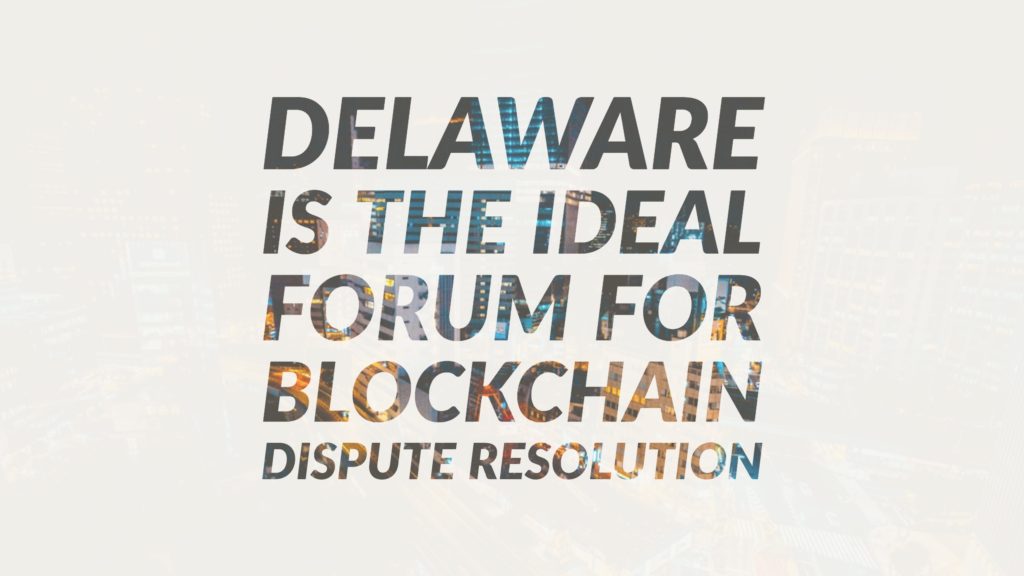
Delaware is the ideal forum for blockchain dispute resolution
Delaware is internationally renowned for its corporate governance regime, which draws from its enabling business statutes and large body of case law, reinforced by its efficient and professional courts.
In addition, the State of Delaware is leading efforts to foster a blockchain technology ecosystem through the Delaware Blockchain Initiative which includes at its core the adoption of a corporate regulatory framework to support the issuance of distributed ledger shares.
These factors combine to make Delaware the leading jurisdiction for resolving disputes involving blockchain technology.
Delaware as a forum for blockchain dispute resolution
Parties to smart contracts on a blockchain (whether public or private) need to agree on how and where disputes are to be resolved. Delaware is the natural forum for blockchain dispute resolution, and the Delaware Rapid Arbitration Act is the right vehicle for arbitration.
Why Delaware?
Delaware is uniquely suited to serve as the forum of choice for blockchain dispute resolution. The State is the corporate home to the majority of Fortune 500 companies, new U.S. IPOs, and most mid-to-large sized venture-backed technology firms, and has a long history of embracing innovation, such as its embrace of the sharing economy.
With respect to corporate law, Delaware is neither management-friendly nor stockholder-friendly; its aim is to provide both managers and investors with laws optimal for engaging in ethical and profitable business, by balancing the need for managerial flexibility with strong tools to hold managers accountable for advancing the best interest of shareholders.
The Delaware Court of Chancery, the oldest business court in the U.S., has subject matter jurisdiction over technology disputes where the controversy is a claim for monetary damages in the amount of $1 million. Therefore, in addition to having subject matter jurisdiction over all equitable and breach of trust claims, the Court of Chancery has subject matter jurisdiction over simple breach of contract claims involving technology, so long as the amount in controversy is more than $1 million.
Under the Delaware Rapid Arbitration Act disputes are resolved in 120 days
Delaware offers a unique and important dispute resolution advantage in the form of the Delaware Rapid Arbitration Act (the “Act”) for business entities seeking fast resolution of their disputes. Under the Act, disputes can be resolved 120 days from the time the arbitrator accepts the appointment. That timeline can be extended to 180 days, but only with the unanimous consent of the parties and the arbitrator. Arbitrators who do not issue final awards within the prescribed timeframe face reductions in their fees corresponding to the length of the delay. The Act can be used to resolve any dispute so long as one of the parties involved is a Delaware business entity, though it need not be located in Delaware.
Add a Delaware Blockchain Arbitration Agent to the parties’ agreement
Under the Act, one of the parties to an arbitration agreement must be a business entity, formed or organized under the law of the State of Delaware or having its principal place of business in the State of Delaware. But when the parties add a Delaware business entity to the agreement to serve as their Delaware arbitration agent, this criteria can easily be satisfied.
The arbitration agent serves as a trusted intermediary to the transacting parties in the event of a dispute and, in doing so, reduces additional costs, and provides the parties greater predictability and flexibility regarding several aspects of the arbitration, including the selection of the arbitrator, the location of the arbitration and other issues that could arise in the event there is a dispute.
For example, when an arbitration agent is a party to the agreement, the parties can decide in advance that, in the event the arbitrator they selected is not available or able to serve, the arbitration agent will select the arbitrator. Similarly, the transacting parties can agree in advance that the arbitration agent will select the location for the arbitration, in the event of a dispute. The arbitration agent can also provide services associated with the arbitration such as filing the necessary documents with the court to initiate arbitration proceedings under the Act, and also serving as escrow agent.
Conclusion
Delaware is uniquely suited to resolve blockchain disputes in the Delaware Court of Chancery and under the Delaware Rapid Arbitration Act.
For more information contact Andrea Tinianow at @AndreaTinianow and Andrea@AndreaTinianow.com
